Alien Devil Trees, Deadly Cargo, and the Blob: September-October 2023 Print SF Magazines
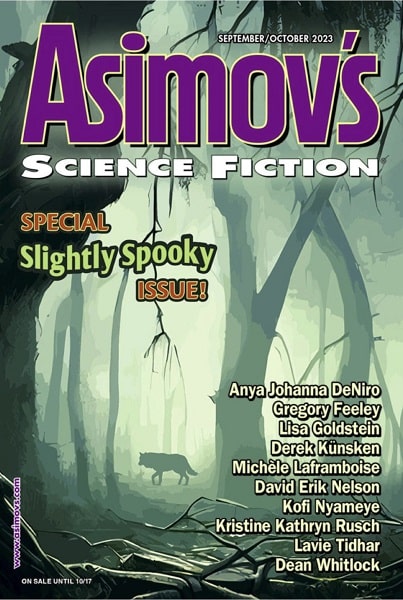 |
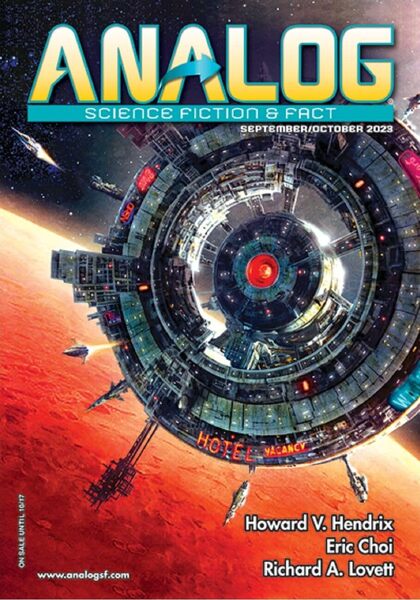 |
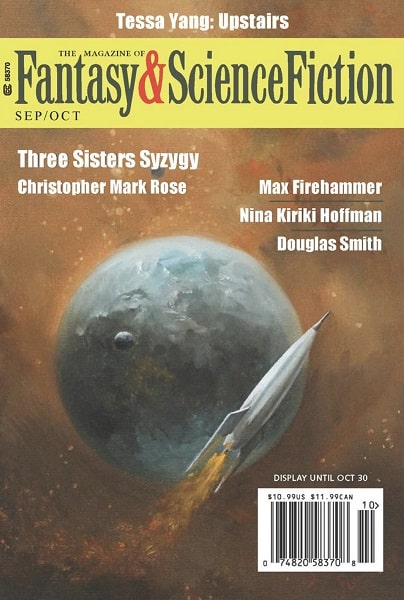 |
September-October 2023 issues of Analog Science Fiction & Fact,
Asimov’s Science Fiction, and The Magazine of Fantasy & Science Fiction.
Cover art by Shutterstock, Tomislav Tikulin, and Marianne Plumridge
There’s plenty of great stuff in this month’s print magazines, including a new Diving Universe novella by Kristine Kathryn Rusch, an homage to the 1958 classic The Blob by Eric Choi, a chilling story of the Dead Letter Office by David Erik Nelson, the gruesome secret of the alien Deviltree by Monalisa Foster, a truck driver who discovers the dreadful truth of his unknown cargo during the “Night Haul” by Andrew Crowley, and the twelfth and final installment of Gregory Feeley’s distributed novel Neptune’s Reach.
The big SF magazines are packed with brand new fiction from Lavie Tidhar, Lisa Goldstein, Derek Künsken, Dean Whitlock, Howard V. Hendrix, Nina Kiriki Hoffman, Phoebe Wood, Christopher Mark Rose, Tessa Yang, and lots more. See all the details below.
Sam Tomaino, the long time short fiction reviewer at SF Revu, finds “a Hugo-worth novella” and much more in the September-October Asimov’s, including stories by Kristine Kathryn Rusch, Gregory Feeley, Lavie Tidhar, Lisa Goldstein, Derek Künsken, and Dean Whitlock.
The fiction begins with the novelette “Deep Blue Jump” by Dean Whitlock.
As the story opens, Kim is only thirteen years old and in charge of a team of child laborers who pick dreamberries, a powerful narcotic. If they try to eat one, they are shot by someone watching from above. When a new group comes in she picks the youngest, a six-year-old girl named Po, and takes her under her wing. As a year passes, they work and become close. But when a girl starts puberty, she is taken away and put to work elsewhere. When that day comes for Kim, she finds something secret about the way things work. Great story!
“Tears Down the Wall” by Michèle Laframboise
In a future where people live in tents attached to the sides of buildings, Zach, a police detective is investigating the death of Hymus Stellar, a social activist whose tent had fallen down many stories and had been impaled on the spikes that surrounded buildings to keep out vagrants. In the pocket of the body was a piece of paper with the name “Manna” on it. Turns out she is the youngest in the rich Thorgate family whose office building is constructed in a way to keep off these tents. She appears to be missing. The story has some twists and turns until we get our ending, a very good one. I was impressed with Laframboise’s creation of this world and her portrayal of Zach. Hope to see more of him in the future.
“The Dead Letter Office” by David Erik Nelson
Patrice is newly working at a post office in Council Bluffs, Iowa, having changed her name, home, and a lot of other things to try to escape a video showing her performing a sex act that an ex-boyfriend had posted online. He had died when his car skidded off the road because of black ice, but the video was still out there. Some men at work recognized her. At her job, she finds letters to Santa that get sent to a modern form of dead letter office. Some are erroneously addressed to “Satan”. She breaks federal law and opens one of them and things take a very dark turn. Chilling story.
“Six Incidents of Evolution Using Time Travel” by Derek Künsken
Six tales of alien species that encourage other species to develop time travel. Imaginative and inventive.
The issue concludes with the novella, “The Break-in” by Kristine Kathryn Rusch.
Another story in her Diving Universe. On a remote planet, a warehouse is storing a huge cache of deadly weapons that have been auctioned off. A powerful man had tried to buy all of them and failed. He was concerned about what would be done with these weapons. He hires a woman who rounds up a team that will go in and steal the weapons before they can go to their prospective buyers. But that caper does not prove easy.
Rusch does a fine job of showing us characters on all sides of this story from warehouse security to the prospective thieves. We feel some sympathy for all of them. Great tale, as always, from Rusch. It will be in my Hugo Short List for Best Novella next year.
Read Sam’s complete review here.
There much to enjoy in the latest Analog, including new stories by Howard V. Hendrix, Eric Choi, Aleksandra Hill, Jennifer R. Povey, Gray Rinehart, Angus McIntyre, and J. T. Sharrah. Mina at Tangent Online shares her thoughts.
“Beware the Glob!” by Eric Choi is a big wink to the 1958 film, The Blob (“It crawls! It creeps! It eats you alive!”). In the film, it was discovered that the alien creature could not be killed but could be frozen. At the end of the film, the creature is lowered into the Arctic. This story imagines what happens when climate change wakes the Glob up… Fun but not fluffy.
In “Rememory” by Joel Armstrong, Julia realises that she has had “cranial anamnestic editing.” Her memories have been wiped and replaced by others. In fact, everyone in her family unit has undergone this treatment for childhood trauma. They are not biologically related to each other but have had memories transplanted so they believe they are a family. Julia’s dad prefers not to know what came before because he is happy with his family life — the love and support they give each other is real. Battling with insomnia, Julia must decide if she will read her medical files with her therapist. Does she want to know why she escaped her past? The story asks a lot of good questions about the role of memory in who we think we are.
“Fly Straight and Don’t Get Eaten” by Vera Brook is an imaginative look at using genetically modified vines to build bridges in a future after the floods. Noah is planning to enjoy his last summer before college by playing in a computer game tournament with his best friends. His mother forces him to spend a weekend with his aunt. Over the weekend, Noah learns about his aunt’s vital work and begins to understand that work can also be rewarding and fun. The story makes it a pleasure to accompany Noah’s voyage of discovery and growing up.
“The Deviltree” by Monalisa Foster is an interesting take on first contact. Masaki is a scientist that is part of a landing party investigating a quantum phenomenon on a planet their mothership is passing. The point of view switches between Masaki and the creature stranded on the planet for perhaps centuries. Its natural form is that of a giant stickbug but it can manipulate atoms at a quantum level and mimic other lifeforms. It is sentient and shows curiosity, courage and compassion. Desperately lonely, it approaches the landing party, saving Masaki from an attack by an indigenous animal… An enjoyable read.
“Bad Car” by Lorraine Alden sets out to prove that a bad car can ruin your life. Jason buys a used car in mint condition at a cheap price. The previous owner had a bad driving record which is visible on the car to all other drivers, the O-score (Ostraciser score). Jason finds that he is judged time and again for the O-score he inherited. The Scarlet Letter meets driving.
“Quickener” by J. T. Sharrah looks at the near disaster caused for Earth by interstellar smuggling and unscrupulous corporate action. Through no fault of his own, Warren finds himself trapped into transporting cargo to Earth that will speed up plant growth. His unexpected crash landing on Earth results in leaking cargo contaminating the rain forest. When the exploding plant growth combines with a herbicide, Warren realises that it could kill all plant life on Earth. Along with the AI Sophia, Warren sets about averting disaster… truly touching. And his conversations with Sophia are a real highlight.
Chuck Rothman and Victoria Silverwolf share reviewing duties for the latest F&SF — including stories by Nina Kiriki Hoffman, Chris Barnham, Phoebe Wood, Christopher Mark Rose, Tessa Yang, Andrew Crowley, Douglas Smith, and Getty Hesse — at Tangent Online.
“Shining Shores,” Max Firehammer’s novelette, takes us to the title town, a little seaside village. Lissa Grant, who often visited in the summer as a child, goes there to find her friend, Paul Kelly, who was staying there, but has not been heard from in a while. She sees some disturbing sights as she explores the town, leading to a discovery of a form of evil. The horror element is very well done and Lissa is a strongly drawn character…
“Teatro Anatomico” by Getty Hesse is set in Renaissance Venice, where a doctor does dissections of dead people for entertainment. The doctor’s daughter takes part and begins to take an interest in one of the corpses, who goes back at night and returns the body parts, which starts the dead man talking to her…
In “Three Sisters Syzygy” by Christopher Mark Rose, an astronaut suddenly finds herself in a parallel reality in which Earth has three moons, and she has two sisters that did not exist in her own universe. The three siblings have wild adventures in space, culminating in an extraordinary climax.
In “Night Haul” by Andrew Crowley, a truck driver accepts an assignment to transport an unknown cargo to a place of mysterious, frightening darkness. A conversation with another trucker over CB radio reveals the dreadful truth about what he’s carrying, leading to a desperate battle against evil. This is an effectively creepy horror story, with a constant mood of impending doom.
“On the Matter of Homo sapiens” by Kel Coleman features three very different robots searching for artifacts of humanity long after people have become extinct. They discuss the possibility of recreating the species, leading to a revelation on the part of one of the machines…
In “Growths” by Nina Kiriki Hoffman, a little girl has two extra arms that she must keep hidden. She and her mother meet the child’s strange father at a restaurant, where they discuss what should be done about her additional limbs before she enters school and is unable to hide them. Although the exact nature of the father is not made explicit, the story has the feeling of science fiction rather than fantasy… quietly effective.
Here’s all the details on the latest SF print mags.
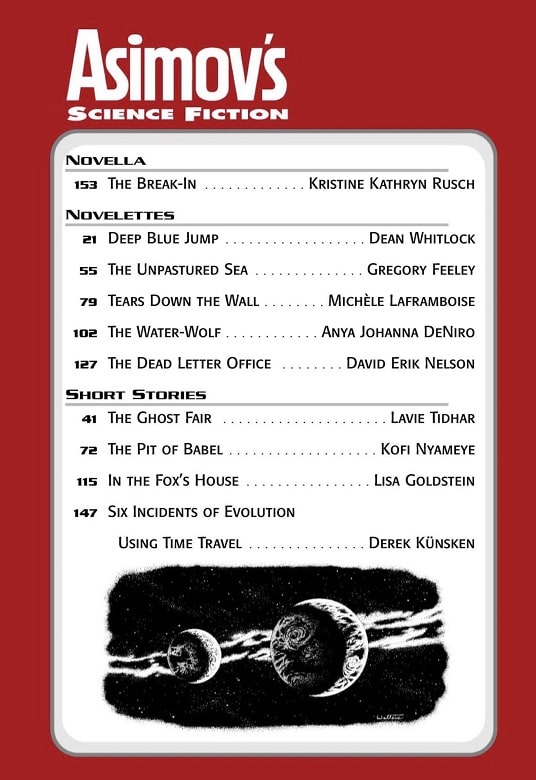 |
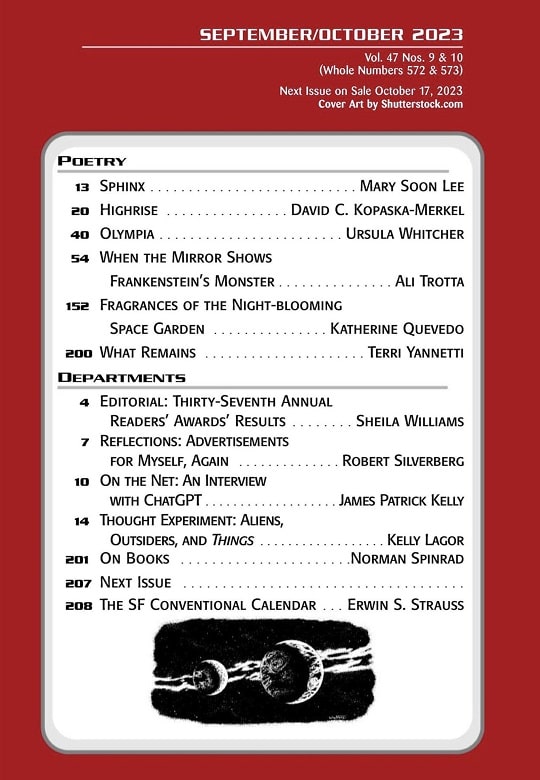 |
Contents of the September-October 2023 issue of Asimov’s Science Fiction
Asimov’s Science Fiction
Here’s Sheila’s summary of the latest issue of Asimov’s, from the website.
Dean Whitlock’s September/October 2023 harrowing novelette about child labor is intense from start to finish. Kristine Kathryn Rusch has created an equally intense novella about “The Break-in” that doesn’t go quite as planned. You won’t want to miss either of these thrilling tales!
Our annual “Slightly Spooky” issue is packed with spooky stories, some of which are even hard SF! Lavie Tidhar reveals that there’s more than one kind of haunt in “The Ghost Fair”; Anya Johanna DeNiro gives us centuries of encounters with the “Water-Wolf”; in “The Pit of Babel,” Kofi Nyameye proves that humanity will clearly stop at nothing; Christopher Rowe lands “Cynthia in the Subflooring”; Lisa Goldstein plunges her character into an equally difficult situation “In the Fox House”; David Erik Nelson pens some dark “The Dead Letter Office”; Derek Künsken discloses “Six Incidents of Evolution Using Time Travel”; Gregory Feeley dives into the perils of “The Unpastured Sea”; and Michèle Laframboise explains the “Tears Down the Wall.”
Robert Silverberg’s Reflections brings us “Advertisements for Myself, Again”; in On the Net, James Patrick Kelly explains “My Interview With ChatGPT”; Norman Spinrad’s On Books considers “Science Fiction Arising”; Kelly Lagor’s Thought Experiment contemplates “Aliens, Outsiders, and Things.”
Here’s the complete Table of Contents.
NOVELLAS
“The Break-In” by Kristine Kathryn Rusch
NOVELETTES
“Deep Blue Jump” by Dean Whitlock
“The Unpastured Sea” by Gregory Feeley
“Tears Down the Wall” by Michèle Laframboise
“The Water-Wolf” by Anya Johanna DeNiro
“The Dead Letter Office” by David Erik Nelson
SHORT STORIES
“The Ghost Fair” by Lavie Tidhar
“The Pit of Babel” by Kofi Nyameye
“In the Fox’s House” by Lisa Goldstein
“Six Incidents of Evolution Using Time Travel” by Derek Künsken
POETRY
Sphinx by Mary Soon Lee
Highrise by David C. Kopaska-Merkel
Olympia by Ursula Whitcher
When the Mirror Shows Frankenstein’s Monster by Ali Trotta
Fragrances of the Night-blooming Space Garden by Katherine Quevedo
What Remains by Terri Yannetti
DEPARTMENTS
Editorial: Thirty-Seventh Annual Readers’ Awards’ Results by Sheila Williams
Reflections: Advertisements for Myself, Again by Robert Silverberg
On the Net: An Interview with ChatGPT by James Patrick Kelly
Thought Experiment: Aliens, Outsiders, and Things by Kelly Lagor
On Books by Norman Spinrad
Next Issue
The SF Conventional Calendar by Erwin S. Strauss
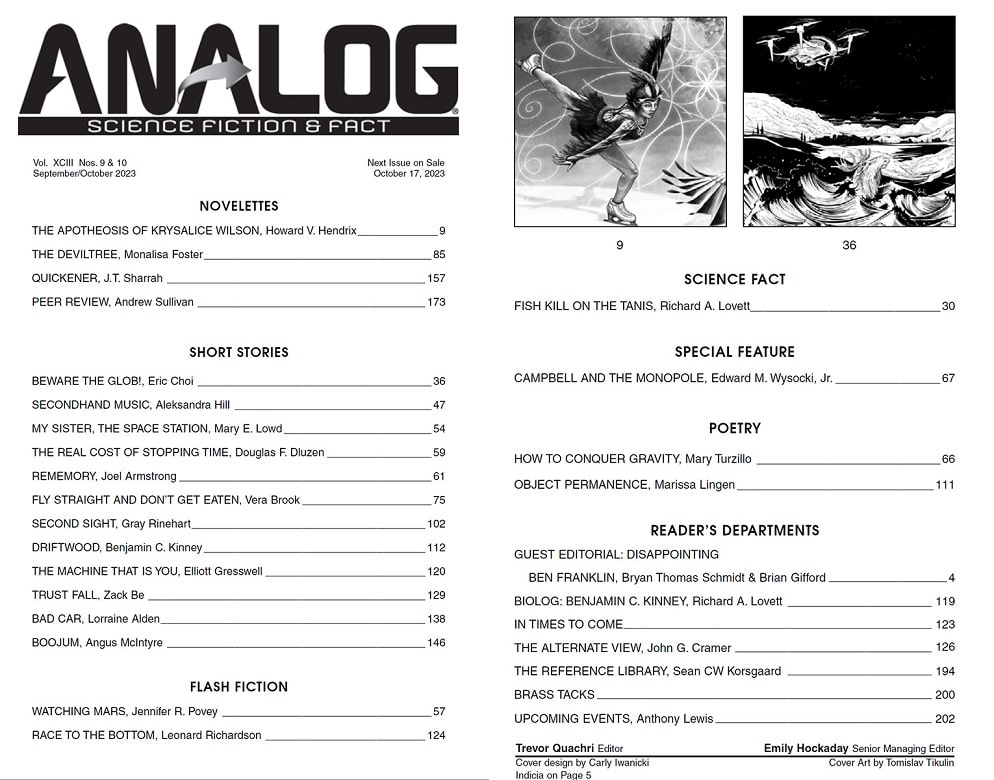 |
Contents of the September-October 2023 Analog Science Fiction & Fact
Analog Science Fiction & Science Fact
Editor Trevor Quachri gives us a tantalizing issue summary, as usual.
In our first story next issue, “The Apotheosis of Krysalice Wilson” by Howard V. Hendrix, cutting-edge training techniques take a young ice-skater to the peak of her ability… and beyond.
Then our fact article looks at how ancient fish fossils are providing new insight into the mass extinction of the dinosaurs in “Fishkill on the Tanis,” from Richard A. Lovett.
Plus we’ll have a plethora of other excellent stories, including: Academic infighting reaches new levels over dueling theories of time-travel in Andrew Sullivan’s “Peer Review”; a little space piracy results in some rapidly-growing problems with jungle flora in “The Quickener,” from J.T. Sharrah; a creative take on First Contact, in Monalisa Foster’s “The Deviltree”; a grandfather must make a heavy sacrifice for his loved ones in “Second Sight,” by Grey Rinehart; an updated riff on a drive-in horror classic, in Eric Choi’s “Beware the Glob”; a catastrophe for an orbital debris cleanup crew requires a big leap of faith in “Trust Fall,” from Zack Be; a team on Titan follows in the footsteps of earlier explorers who have gone missing, and finds more than they bargained for in “Boojum,” by Angus McIntyre; a musician with a prosthesis fights to make music on her own terms, in Aleksandra Hill’s “Secondhand Music”; Smart vehicles and “social credit scores” collide in “Bad Car,” from Lorraine Alden.
Plus pieces from Benjamin Kinney, Vera Brook, Leonard Richardson, Jen Povey, and Edward M. Wysocki, as well as all our regular columns.
Here’s the full TOC.
NOVELETTES
“The Apotheosis of Krysalice Wilson,” Howard V. Hendrix
“The Deviltree,” Monalisa Foster
“Quickener,” J.T. Sharrah
“Peer Review,” Andrew Sullivan
SHORT STORIES
“Beware the Glob!,” Eric Choi
“Secondhand Music,” Aleksandra Hill
“My Sister, the Space Station,” Mary E. Lowd
“The Real Cost of Stopping Time,” Douglas F. Dluzen
“Rememory,” Joel Armstrong
“Fly Straight and Don’t Get Eaten,” Vera Brook
“Second Sight,” Gray Rinehart
“Driftwood,” Benjamin C. Kinney
“The Machine that is You,” Elliott Gresswell
“Trust Fall,” Zack Be
“Bad Car,” Lorraine Alden
“Boojum,” Angus Mcintyre
FLASH FICTION
“Watching Mars,” Jennifer R. Povey
“Race to the Bottom,” Leonard Richardson
SCIENCE FACT
Fish Kill on The Tanis, Richard A. Lovett
SPECIAL FEATURE
Campbell and the Monopole, Edward M. Wysocki, Jr.
POETRY
How to Conquer Gravity, Mary Turzillo
Object Permanence, Marissa Lingen
DEPARTMENTS
Guest Editorial: Disappointing Ben Franklin, Bryan Thomas Schmidt & Brian Gifford
Biolog: Benjamin C. Kinney, Richard A. Lovett
In Times to Come
The Alternate View, John G. Cramer
The Reference Library, Sean Cw Korsgaard
Brass Tacks
Upcoming Events, Anthony Lewis
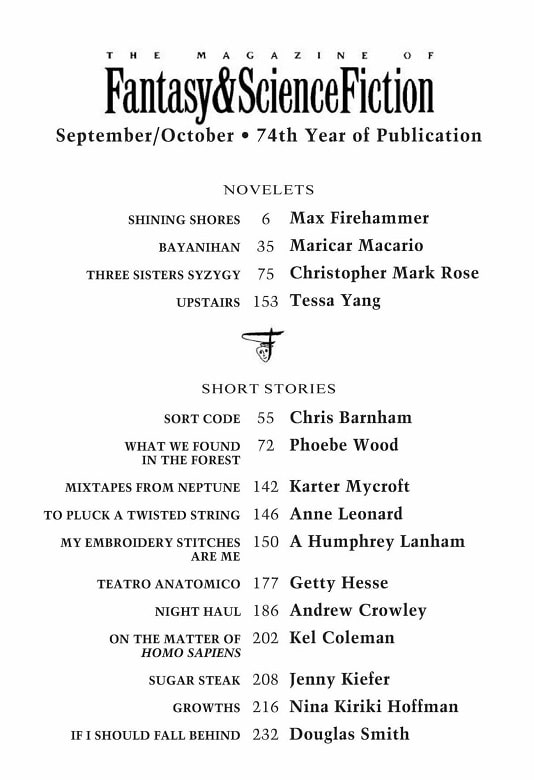 |
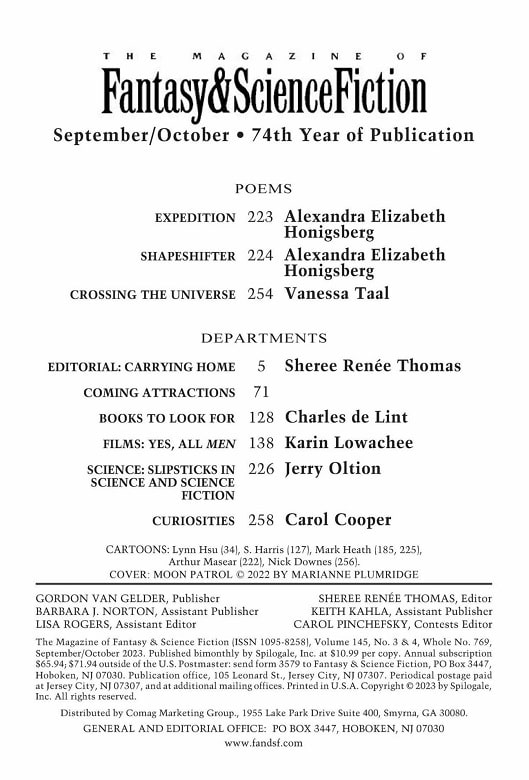 |
Contents of the September-October issue of The Magazine of Fantasy & Science Fiction
The Magazine of Fantasy & Science Fiction
F&SF’s editor is Sheree Renée Thomas. Last year she would post her thoughts on each issue to Facebook, though there’s no sign of her continuing that trend in 2023.
Here’s the Table of Contents.
Novelets
“Shining Shores” by Max Firehammer
“Bayanihan” by Maricar Macario
“Three Sisters Syzygy” by Christopher Mark Rose
“Upstairs” by Tessa Yang
Short Stories
“Sort Code” by Chris Barnham
“What We Found in The Forest” by Phoebe Wood
“Mixtapes From Neptune” by Karter Mycroft
“To Pluck a Twisted String” by Anne Leonard
“My Embroidery Stitches Are Me” by A Humphrey Lanham
“Teatro Anatomico” by Getty Hesse
“Night Haul” by Andrew Crowley
“On the Matter of Homo sapiens” by Kel Coleman
“Sugar Steak” by Jenny Kiefer
“Growths” by Nina Kiriki Hoffman
“If I Should Fall Behind” by Douglas Smith
Poems
Expedition, Alexandra Elizabeth Honigsberg
Shapeshifter, Alexandra Elizabeth Honigsberg
Crossing The Universe, Vanessa Taal
Departments
Editorial: Carrying Home, Sheree Renée Thomas
Coming Attractions
Books To Look For, Charles De Lint
Films: Yes, All Men, Karin Lowachee
Science: Slipsticks In Science And Science Fiction, Jerry Oltion
Curiosities, Carol Cooper
Cartoons: Lynn Hsu, S. Harris, Mark Heath, Arthur Masear, Nick Downes
Cover: Moon Patrol by Marianne Plumridge
Analog, Asimov’s Science Fiction and The Magazine of Fantasy & Science Fiction are available wherever magazines are sold, and at various online outlets. Buy single issues and subscriptions at the links below.
Asimov’s Science Fiction (208 pages, $8.99 per issue, one year sub $55.90 in the US) — edited by Sheila Williams
Analog Science Fiction and Fact (208 pages, $8.99 per issue, one year sub $55.90 in the US) — edited by Trevor Quachri
The Magazine of Fantasy & Science Fiction (256 pages, $10.99 per issue, one year sub $65.94 in the US) — edited by Sheree Renée Thomas
The September-October issues of Asimov’s and Analog are on sale until October 17; F&SF until October 30. See our coverage of the July-August issues here, and all our recent magazine coverage here.